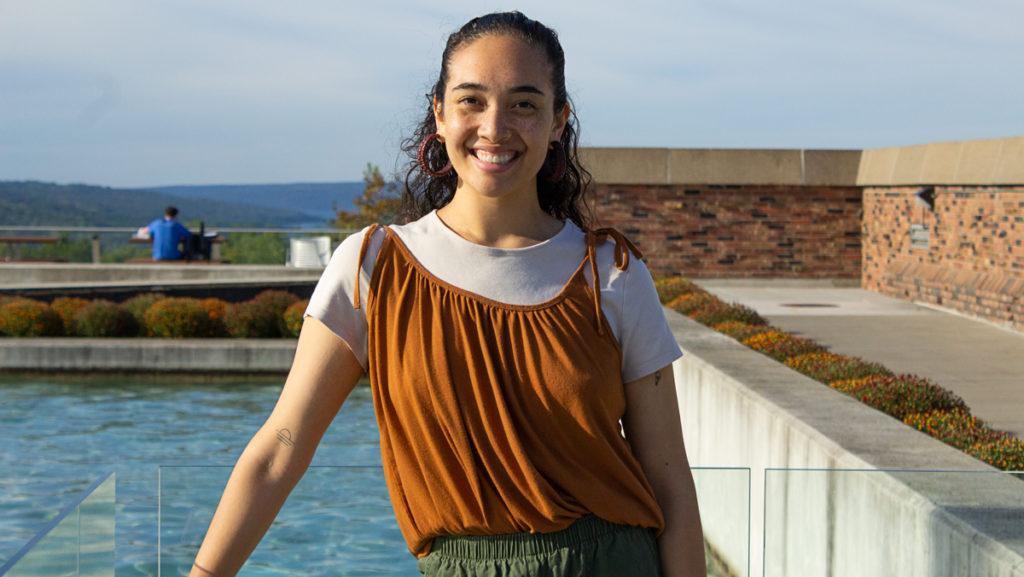Senior music major Wren Murray will spend the 2019–20 academic year researching the lack of diversity and inclusivity in the School of Music as a part of the 2019–20 President’s Fellows program. Murray was one of five campus community members selected for the program through an intense application and interview process.
The program, now in its second year, gives selected students, staff and faculty members an opportunity to take on a special project or projects under the mentorship of a campus leader. Every fellow chooses to explore a specific topic related to campus life and to put their research and findings toward a final product of their choice.
Opinion Editor Brontë Cook spoke with Murray about her desire to diversify music education and her experiences so far in the President’s Fellows program.
This interview has been edited for length and clarity.
Brontë Cook: Tell me about your involvement with the President’s Fellows Program.
Wren Murray: The President’s Fellows Program is only two years old. … It’s a very open-ended thing. … I’m starting with a kind of a general goal to make the music school more inclusive. … I’m starting out with music education majors, … [to look at] what they’re thinking about equity and how important it is. … Then, also, I really want to look into admissions. That’s kind of the next step, to see how we’re reaching out to underrepresented people. … The music school is not diverse at all. … It just has to do with who has access to great music education at a music institution. Those people have had private lessons for years and years. They’ve had good educators, maybe they were in a really good school district — that kind of implies that they have a really big tax base. … It really starts from the ground level.
BC: What is your personal experience as a person of color in the music school?
WM: Music education is very white. And I was pretty used to it, just kind of like, “Oh, this is just how it is.” But over the years, I’ve been like, “It doesn’t need to be this way.” … Other schools are communicating with the outside, whereas I feel like the music school, … it maintains this concentration, like studying the same dead white people every year. But it could have a whole different perspective, have all different populations come together and have just a whole new culture of learning what we want to learn. … There’s a lot of change that’s happening. Not immediately, but in the works. I know that faculty members are looking into changing the curriculum and looking into studying music that other people have access to and other people are really passionate about rather than these elitist kind of styles.
BC: Why is looking at diversity and accessibility to higher education important? In the music school, especially?
WM: The college as a whole wants to be a learning environment for everybody. … Not only that but to have an institution that’s truly diverse. We’re getting more and more people from underrepresented populations. Especially after President [Shirley M.] Collado came in — she really wants to change things and move forward and make the college competitive in the future. … I don’t mean acceptance rate. Competitive as in people really want to go here because they have these really strong values of inclusion and letting people in.
BC: So how does the President’s Fellows program give you resources to explore this issue? How will you go about it?
WM: The benefits are being able to step into space that students aren’t normally allowed to. … It tells you that they really are bridging the gap between administration hierarchies. … In the beginning, we had paperwork to sign up — we can’t disclose certain information, stuff like that. So we can go into different spaces, like admissions or just really behind the scenes things and see what the administration is doing. … We have access to asking anyone any questions, getting our foot in different doors. … The structure is pretty fluid. … I feel like people respect me a lot more, just from being a part of this, which is weird but cool.
BC: What is it like to be in these administrative spaces that students typically don’t get the opportunity to be in?
WM: I think it gives me a lot more insight about how the college is really working hard. … It’s a huge institution. I feel like [the program] has influenced me to think. … I have the power to be involved in the future of the college. … I’ve never felt more connected to the school until this year. … I think transparency is so important. That’s what’s so great about the program, too, is that off the bat, the whole senior leadership team was so clear in saying, “You do not know what the end is going to look like. You don’t know what your end goal will be. You’ll just meander, find things and collect ideas that will speak directly to your final project, whatever that may be.”
BC: So what are you going to do with all the research you collect? Do you know yet?
WM: It’s pretty open-ended. Everyone has to at least present their whole year to the senior leadership team, but I think a lot of people will do something else. I’m thinking maybe I’ll do a presentation or like, a guided discussion forum. Those are just things floating in my head. This is hard work. We work like every day. … It shows itself in different ways.














